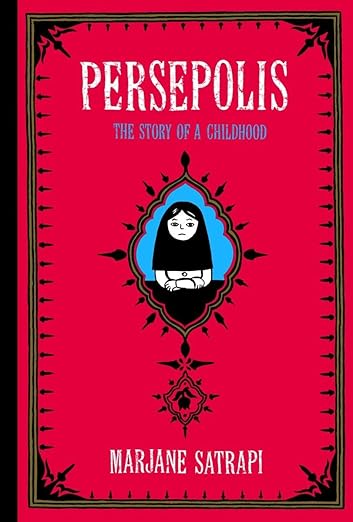Iran is a country with a millennia-old culture, the cradle of ancient civilizations. Over the centuries, it has played a significant role in the development of art, science, and philosophy, leaving a profound mark on humanity’s cultural heritage.
In terms of writing, there are numerous authors whose work allows us to gain a deeper understanding of the many facets of Iran, a country that ranges from religious extremism to daily realities surprisingly similar to those of any other place.
In this article, we’re focusing on books by female authors, to give voice to several contemporary Iranian writers, and to try to better understand, through their eyes, yesterday’s and today’s Iran.
Persepolis
Persepolis is the autobiographic graphic novel by Marjane Satrapi. The author recounts of her growing up between 1980, during the Islamic Revolution, and 1996, when revolutionary events had drastically changed the country.
Published in France in 2000, an immediate best seller, it is an irreverent and passionate account of the author’s life, set against the backdrop of an Iran in revolt.
The internal conflicts that run through Satrapi, torn between a visceral love for her homeland and the desire to leave it, reflect the same tensions that tear Iran apart.
Funny and touching, this book was made into an animated film in 2007: written and directed by the author herself, it received an Oscar nomination and won the Jury Prize at the Cannes Film Festival.


Things I’ve Been Silent About
In her autobiography, Things I’ve Been Silent About, Azar Nafisi, a writer, scholar, and literature teacher, describes her journey growing up in Iran, intertwining complex family dynamics with historical and political events.
It’s an intimate and touching book, in which Nafisi recounts her childhood, focusing on her affectionate relationship with her father, a political figure and mayor of Tehran, and her difficult and often conflictual relationship with her mother, one of the first women to sit in the Iranian Parliament.
As in her celebrated Reading Lolita in Tehran, Nafisi relies on literature to build an inner refuge and to escape the oppression of her time and society.
Things I’ve Been Silent About is a melancholic and intense work, driven by a profound love for her homeland and its contradictions. A family saga that, through the author’s personal experience, offers the reader an authentic glimpse into twentieth-century Iran.
Aria
Tehran 1953: on a freezing cold night, a newborn baby is abandoned by her mother under a mulberry tree. An army driver finds her and decides to take her with him.
Thus begins the story of Aria, the name chosen by her adoptive father. Her journey leads the reader through the complexities of Iranian history in the period leading up to the 1979 revolution.
In this debut novel, Nazanine Hozar highlights the economic divisions and resentments that led to the revolution. Social tensions build as the novel unfolds, fueling its gripping pace and successfully conveying both historical information and a sense of deepening confusion.
An epic novel that, in addition to tackling historical and cultural themes, explores various issues: abandonment, violence, family, and love. All the characters are described in depth, in an intimate and engaging way.


We Women of Tehran
Farian Sabahi is an Italian-Iranian scholar and journalist who, in We Women of Tehran, explores what it means to be a girl, and a woman, in a complex and fascinating country like Iran.
The first part is a play: a first-person account of the origins of the Iranian capital, highlighting its contradictions with an ironic perspective that invites us to smile and overcome stereotypes.
A short but touching story, in which Sabahi doesn’t simply describe the plight of women, but traces the country’s history, customs, flavors, and landscapes, taking the reader on a journey that weaves together politics and culture.
In the second part, Sabahi engages with Nobel Prize winner Shirin Ebadi in a compelling dialogue about politics, rights, and the future of Iran.
Elle Joue (available in French and Italian)
Nahal Tajadod was born in Iran to a secular intellectual family. She moved to France in 2007 and established herself as a scholar of Eastern religions, writing several essays on Buddhism and publishing several texts on the life of the Persian mystic poet Rumi.
At the heart of her novel, Elle Joue (L’Attrice di Teheran in Italian), is the friendship between two women: a writer who left Iran during the Shah’s reign and retains the vision of a secular, pro-Western country, and a young actress who grew up under the ayatollahs, amid censorship and repression.
The confrontation of these two visions gives rise to a rich and engaging novel, in which the protagonists recount their life experiences, often marked by painful and uncomfortable events, yet determined to assert their own identities and talents.

Barbara Amalberti, translated from Italian by Anna Cereti
Image by Atiyeh Fathi for Unsplash


